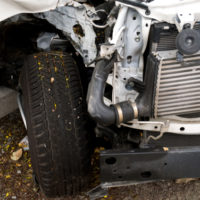Legal Responsibility For Florida Rental Car Collisions

A basic principle of car crash law is that while the tortfeasor (negligent driver) is always at fault, the tortfeasor is not necessarily legally responsible for damages. That status usually belongs to the property owner. For example, if the tortfeasor borrows someone else’s car, the vehicle owner may be liable for damages. That is the essence of the negligent entrustment rule.
But negligent entrustment may not apply in commercial cases, because of the Graves Amendment. Fortunately for car wreck victims, 49 USC 30106 has some very large holes. Therefore, victims may be able to access the deep pockets of companies like Enterprise and U-Haul. That’s especially important in Port St. Lucie catastrophic injury matters. The tortfeasor may not have enough insurance to fully compensate victims in these cases.
Background to the Graves Amendment
In 2005, the House of Representatives added this amendment to a huge transportation bill. Its author, Missouri Democrat Sam Graves, stated on the record that he wanted to protect rental car companies and their “mom and pop” affiliates from large liability judgments.
That is about all we know about the provision. There were only a few minutes of floor debate, and there were no legislative hearings. Florida courts have done little with the Graves Amendment, other than apply the words in the statute itself. The brief provision has two main subparts. As mentioned earlier, neither one is ironclad.
The “Trade or Business” Requirement
According to (a)(1), the immunity from lawsuit only applies to agents or affiliates of vehicle rental companies which are “engaged in the trade or business of renting or leasing motor vehicles.” Lawmakers did not bother to define this key phrase. In the absence of a separate definition, attorneys and parties must use the ordinary meaning.
The IRS does define “trade or business.” But its definition (“any activity carried on for the production of income from selling goods or performing services”) is extremely broad and not very useful. Congress clearly intended to limit immunity. So, it may be better to look to the Uniform Commercial Code. The UCC comes up quite frequently in negligence cases, particularly those which involve a defective product. The UCC also defines “merchant,” which is a similar term, as a person who deals in goods of a particular kind and/or has special knowledge about such goods.
Arguably, this definition does not apply to (a)(1). The clerks and owners at most vehicle rental establishments have no special knowledge about the cars or trucks on the lot. Furthermore, many such companies do not deal exclusively in vehicles. They are really moving and storage companies which happen to rent trucks as well.
The “Not Otherwise Negligent” Requirement
In 2005, it was essentially impossible for private individuals to verify a driver’s license, aside from a visual inspection. So, that’s all that most vehicle leasing companies did. But now, it is rather easy to call up a driver’s record. In fact, such verifications are becoming the industry standard in this area.
Failure to follow industry standard is clear evidence of negligence. Some states have even gone a little further. For example, in California, it is negligence as a matter of law to rent a car to someone with a suspended drivers’ license.
Knowledge of incompetence is also an element in a negligent entrustment case. Willful blindness does not count. The owner cannot ignore evidence, or potential evidence, and claim ignorance.
Reach Out to Tenacious Lawyers
The Graves Amendment makes it harder, but not impossible, to establish third-party liability in rented vehicle cases. For a free consultation with an experienced personal injury attorney in Port St. Lucie, contact Eighmie Law Firm, P.A. We do not charge upfront legal fees in negligence cases.
Resource:
law.cornell.edu/uscode/text/49/30106


